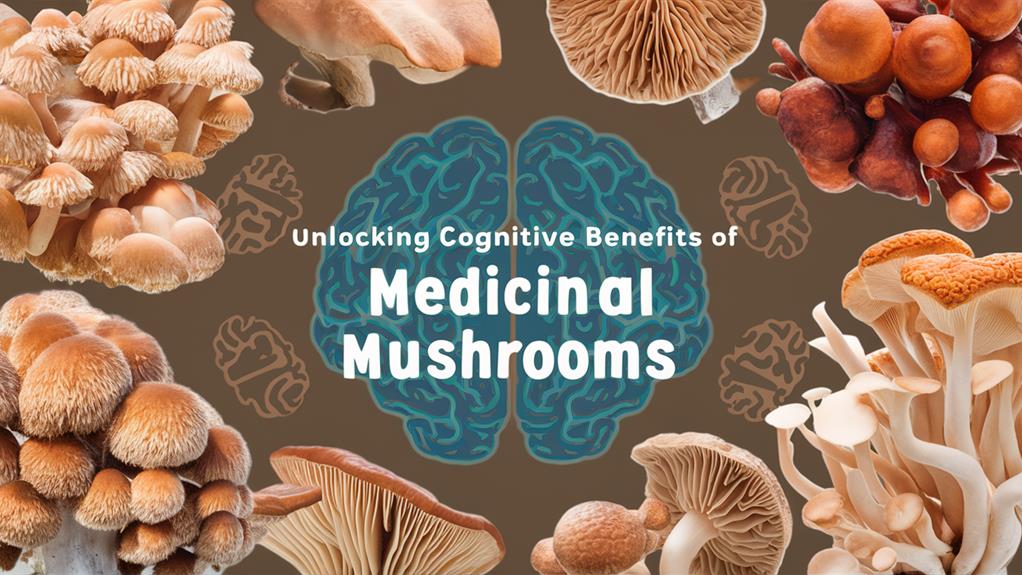
Medicinal mushrooms, especially lion's mane, are gaining attention for their impressive cognitive benefits. These fungi can boost memory and mental clarity by promoting nerve growth factor production, which is crucial for brain health. They help create new connections between neurons and reduce anxiety or depression symptoms. Historically, cultures like the Chinese have valued mushrooms for supporting cognitive function and overall vitality. Recent studies link regular mushroom consumption to better brain health and memory. There's exciting ongoing research exploring how these mushrooms might combat cognitive decline, so you'll find intriguing insights as you explore further.
Overview of Medicinal Mushrooms

Medicinal mushrooms, with their rich history in traditional medicine, particularly in Asia, have captivated health enthusiasts for centuries. Among these mushrooms, Hericium erinaceus, commonly known as lion's mane, stands out for its impressive cognitive benefits.
Research has shown that medicinal mushrooms are packed with bioactive compounds that offer various health benefits, including cognitive function enhancement through the stimulation of nerve growth factor production. These compounds are known for their neuroprotective effects, which can help enhance cognitive function and promote nerve growth.
Clinical studies have indicated that lion's mane may improve memory and reduce symptoms of anxiety and depression, making it a valuable ally for mental health. Additionally, these mushrooms contain antioxidants and anti-inflammatory properties that contribute to their overall effectiveness.
As the interest in functional foods grows, many people are turning to mushroom supplements to tap into these potential benefits. By incorporating medicinal mushrooms into your diet, you may experience improved cognitive function and mood enhancement.
The fascinating world of medicinal mushrooms, especially lion's mane, continues to unfold, revealing a promising future for natural cognitive support. Whether you're exploring traditional medicine or modern supplements, the potential of these remarkable fungi is worth considering.
Lion's Mane and Neurogenesis
Lion's Mane mushroom (Hericium erinaceus) is particularly notable for its role in neurogenesis, the process by which new neurons are generated in the brain. This remarkable mushroom enhances nerve growth factor (NGF) synthesis, which is crucial for the growth, maintenance, and survival of neurons.
Recent studies suggest that health benefits of mushrooms extend beyond neurogenesis, potentially supporting cognitive function and overall brain health. When you consider cognitive function, Lion's Mane shows promise in improving memory and mental clarity. Pre-clinical trials indicate that supplementation with this mushroom promotes neurogenesis and synaptic plasticity, both vital for learning and adaptation.
Active compounds found in Lion's Mane also increase the size of growth cones, which are essential for neuron connectivity and communication. Research published in the Journal of Neurochemistry highlights how Lion's Mane extracts can regulate neuronal growth and development, suggesting exciting implications for neurodegenerative disorders.
As scientists explore the bioactive compounds in Lion's Mane, they aim to uncover specific mechanisms that influence brain health. These findings pave the way for potential therapeutic applications, making Lion's Mane not just a fascinating subject of study, but also a promising ally in promoting cognitive health and battling neurodegenerative conditions.
Historical Uses in Traditional Medicine

Throughout history, cultures around the world have recognized the unique benefits of mushrooms in traditional medicine. Many ancient texts reveal how these natural wonders were valued for their medicinal properties, especially in traditional Chinese medicine.
Key mushrooms like *Ganoderma lucidum* (reishi) and *Hericium erinaceus* (lion's mane) have a rich legacy of health benefits, particularly for cognitive functions and immune function. These mushrooms are also known for their anti-inflammatory and immune-boosting properties, which have contributed to their revered status in various healing practices.
Here are three significant historical uses of mushrooms in traditional medicine:
- Vitality Enhancement: Ancient practitioners believed mushrooms boosted energy and overall well-being.
- Cognitive Support: *Hericium erinaceus* was commonly used to address ailments related to nerve health and cognitive performance.
- Immune Function: *Ganoderma lucidum* was praised for its ability to enhance immune responses and promote longevity.
Today, modern research seeks to validate these uses through scientific evidence, shedding light on how these historical applications connect to contemporary health practices.
Mechanisms Behind Cognitive Enhancement
The historical applications of mushrooms in traditional medicine lay a fascinating foundation for understanding their cognitive benefits today. You might be surprised to learn that specific mushrooms, like Hericium erinaceus, or lion's mane, contain active compounds that promote nerve growth and enhance neuron connectivity. This means they can potentially improve your cognitive function and memory.
Research shows that extracts from these mushrooms can increase growth cone size, which is essential for neural connectivity and communication. This suggests a clear mechanism for enhancing cognitive abilities.
Additionally, laboratory tests reveal that bioactive compounds from medicinal mushrooms can regulate neuron growth and influence memory formation through their neurotrophic effects.
Epidemiological studies also highlight that including mushrooms in your diet may benefit cognitive health, showcasing the power of these bioactive compounds in improving neurocognitive function.
Furthermore, scientists are exploring how mushroom compounds can modulate oxidative stress and inflammation—two critical factors in cognitive decline. By understanding these mechanisms, you can appreciate how certain mushrooms might support your brain health and cognitive performance, making them a valuable addition to a healthy diet.
Future Research Directions

Exploring the future of research on medicinal mushrooms offers exciting possibilities for enhancing cognitive health. To fully unlock their potential, researchers should focus on several key areas:
- Synergistic Effects: Investigate how combining different mushroom species could amplify their cognitive benefits, especially for neurodegenerative conditions like Alzheimer's disease.
- Optimal Dosages and Administration Routes: Determine the best dosages and methods for delivering bioactive compounds from mushroom extracts. This is crucial for maximizing their neuroprotective effects.
- Clinical Trials: Conduct long-term clinical trials to assess the safety and efficacy of mushroom supplements in boosting cognitive function and preserving memory.
Furthermore, an interdisciplinary approach that merges mycology, neuroscience, and pharmacology will be vital. This collaboration can reveal how bioactive compounds influence brain health.
Future studies should also aim to create functional foods that incorporate these mushroom extracts, specifically targeting cognitive decline prevention and management. By focusing on these research directions, we can better understand the therapeutic potential of medicinal mushrooms and pave the way for innovative solutions in cognitive health.
Conclusion
In conclusion, medicinal mushrooms, like Lion's Mane, show great promise for enhancing cognitive function. Research supports the idea that these fungi can stimulate neurogenesis, which is the growth of new brain cells. This fascinating connection between nature and brain health invites further exploration, as scientists continue to uncover the mechanisms behind these benefits. As you consider integrating medicinal mushrooms into your wellness routine, remember that ongoing research may reveal even more about their potential impacts on your cognitive abilities.
